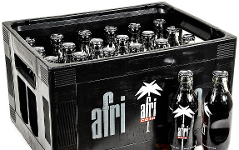Britvic
Adapting To U.K. Preferences For Low-Sugar Drinks Benefits Britvic
Low-sugar and fruit-based drinks contributed to healthy first quarter revenue for U.K.’s Britvic. The company says it adapted to changing consumer preferences toward low sugar and healthier drinks, but was affected by Britain’s sugar tax levy in force last April. Revenue rose 4.5 percent to $469 million in the quarter. The company said it is also fending off competition from Nichols and Refresco by adding citrus variants to its portfolio.
Carlsberg
Carlsberg Rides Wave Of Popularity Of Alcohol-Free Beer
Danish brewer Carlsberg says alcohol-free brews are booming in Western Europe. Its volumes grew 33 percent across Western Europe in FY2018, results that encouraged the company to put “a lot of money behind that going forward.” Its first global standalone alcohol-free brew Birell, launched in May in Bulgaria and Poland, was met with a “positive response.” A wider roll- out is planned for this year. Carlsberg’s craft, specialty and alcohol-free brews now make up 30 percent of its global revenues. Birell contains fewer calories than regular beer and has isotonic properties, “making it the perfect refreshment for those who like to be active,” the company said. Carlsberg launched the beer in response to 90 percent growth in the alcohol-free beer category over the last 10 years.
Carlsberg Unveils Revamped Danish Pilsner In U.K.
Hoping to strongly emphasize its Danish heritage, Carlsberg has renamed and reformulated its flagship U.K. beer Carlsberg Danish Pilsner. The idea is to get back to the principles of founder JC Jacobsen by using brewing ingredients that create “the best-ever quality beer.” Backed by a multi-million-pound investment, and featuring a new visual identity and an integrated consumer marketing campaign, the revamped beer will be available March 1. Cans will feature Snap Pack glue technology – a recent winner of the best CSR/sustainability award – in a move to reduce plastic usage. Carlsberg last week posted a three percent rise in full-year net revenue following strong performance in core and craft beer brands, and in no- and low-alcohol products.
Companies
Britvic’s Robinsons Fruit Flavor Creations Enters Convenience, Wholesale Channels
Britvic is launching its Robinsons Fruit Creations range into convenience and wholesale channels, following the product’s “ongoing success” in the grocery sector. The range will be available in orange & mango and peach & raspberry flavors in one-liter price-marked packs retailing at $2.65. The company will also be running a new price-marked deal of two for $3.33 across Robinsons core 900 ml range, in apple & blackcurrant, orange & pineapple, tropical, orange and summer fruits flavors.
RJ Corp
India’s Varun Beverages Acquires Further Franchise Rights
PepsiCo franchisee Varun Beverages Limited, of India said it plans to enter into a binding agreement to acquire franchise rights from SMV Group in Karnataka (13 districts), Maharashtra (14 districts) and Madhya Pradesh (3 districts), subject to approval. The move boosts Varun Beverage’s presence to 22 states and two union territories in India. According to the company, the acquisition aligns with its strategy to expand its footprint in nearby markets, leading to improved operating leverage and maximum asset utilization through economies of scale.
Suntory
Suntory Says Japanese Office Workers Prefer PET Bottled Coffees
Suntory says PET bottled coffee, especially its “Craft BOSS” variant, is increasingly popular among younger Japanese office workers and female consumers, and is a key driver of sales in Japan’s shrinking RTD coffee market. Annual sales of Craft BOSS, launched in April 2017, surpassed 27 million cases in 2018, “a very strong performance” and the “largest driver of record highs” in 2018. Today’s office workers like the PET bottle because it has a cap allowing slow drinking, “little by little.” The company said canned coffee is still preferred by traditional workers, the largest segment of the RTD coffee market. According to Euromonitor, Suntory continues to be the leading player in RTD coffee due to the major success of its “Craft BOSS” variant. The company hopes to maintain momentum in 2019 through marketing campaigns and a unique product portfolio. Suntory will be raising the prices of all PET bottled products that are at least 1.2 liters.
Japanese Whisky Companies Trim Portfolios As Supplies Of Aged Variants Plummet
Japanese whisky companies Suntory and Nikka plan to discontinue several whisky ranges. Hibiki 17 and Hakushu 12 were discontinued last May when distilleries ran out of aged stock. Suntory is discontinuing the blended whisky Shirokaku’s 700 ml, 1.92-liter, 2.7-liter and 4-liter bottles, single grain Chita’s 350 ml bottles, and blended whisky Kakubin’s 450 ml bottles, a bestseller in Japan. The cuts help explain Suntory’s push to introduce its new Ao whisky, produced in combination with other distilleries from around the world. Nikka is discontinuing Nikka 12, one of the last budget-friendly aged Japanese whiskies, and “temporarily suspending” Coffey Grain and Malt whiskies. The 12-year-old will apparently be replaced by a new release, the no age statement (NAS) “Tailored.” The nationwide shortage of aged whisky stocks has prompted the release of an increasing number of NAS and blended whiskies. The shortage of aged whisky has deepened as demand has surged in the past decade, especially at auction, with distilleries simply unable to maintain levels of aged stocks, forcing it to lean further on younger, blended variants.
Copyright 2026 Business360, Inc.

